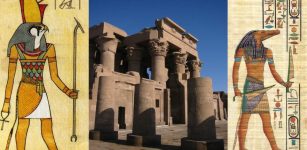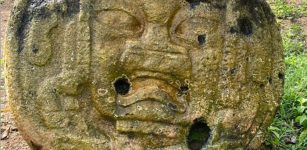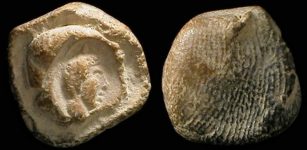Hawass Says Claims That The Ancient Egyptian Civilization Was Black Are Lies
Jan Bartek- AncientPages.com - The origin of ancient Egyptian civilization remains a subject of scholarly debate, with diverse perspectives on its ethnic and cultural roots. Whether ancient Egyptian civilization had predominantly African origins is a complex and contentious issue extensively discussed in academic circles.
Left: Zahi Hawass (Photo: Zahi Hawass official Facebook account) - Right: Granite sphinx of Taharqa, 25th Dynasty, c. 690-664 BC. This statue from Kawa (Temple T) in Sudan shows the Pharaoh's face on a Lion figured sphinx, a form of royal representation borrowed from Middle and New Kingdom art. Credit: Narcissistic Nubian - CC BY-SA 4.0 - Image compilation - Ancient Pages
Traditionally, ancient Egypt has been portrayed as a distinct and autonomous civilization, seemingly isolated from the influence of surrounding African cultures. However, some historians say that evidence suggests a more nuanced reality, wherein the dynamics between Egypt and its African neighbors were characterized by cultural exchange and shifting power balances. This perspective proposes periods of interaction and integration between Egyptian and other African cultures, leading to a revitalization and reinterpretation of Egyptian customs, religious practices, and cultural expressions.
It is worth noting that for over two millennia, Egypt maintained a position of dominance in its relationship with its southern neighbor, the kingdom of Nubia. However, this balance of power experienced a significant shift during the 25th dynasty, often called the Nubian or Kushite dynasty.
A prominent figure from this period was Taharqa, widely recognized as one of the most influential of the so-called "black pharaohs." Taharqa, the son of Piye and cousin and successor to Shebitku, ruled as a pharaoh of the 25th dynasty of Ancient Egypt and simultaneously as the king of the Kingdom of Kush in Northern Sudan. His reign spanned from approximately 690 to 664 BCE.
The era of Taharqa, sometimes referred to as "The Black Pharaoh," represents a significant chapter in Egyptian history. Beginning around 750 BCE and continuing for about a century, Nubian rulers disrupted the long-standing power dynamics, assuming control over Egypt. This period marked a notable shift in the region's geopolitical landscape and has been the subject of considerable historical and archaeological research.
Dr. Zahi Hawass, a prominent Egyptologist and former Minister of Antiquities, has recently addressed claims made by Afrocentrist advocates regarding the origins of ancient Egyptian civilization. Hawass has characterized these claims as lies and “false and misleading information.”
The controversy arose following a social media post by Professor Kaba Kamene, an Afrocentric advocate. Kamene shared a photograph on Facebook depicting himself and a group of Afrocentrists at the Egyptian Museum in Cairo's Tahrir Square. The caption accompanying the image stated, "I am Teaching Kenet Travel Group at Cairo Egyptian Museum our history."
This post sparked a significant reaction among Egyptians, prompting Hawass to respond. He specifically challenged the assertion of 'Black origins' for ancient Egyptian civilization, labeling such claims as false and lacking in historical accuracy.
This incident highlights the ongoing debate surrounding interpreting ancient Egyptian history and the complexities involved in discussions about this civilization's racial and cultural origins.
“We are not against Black people at all, but we are against this group that entered the Egyptian Museum in Tahrir to announce ideas that have no basis in truth and are fantasies,” said Hawass in a statement.
"He noted that the Afrocentric movement aims to create confusion by spreading false and misleading information that the origin of Egyptian civilization is Black.
Hawass explained that the Black Kingdom of Kush ruled Egypt in 500 B.C., which was the end of the Pharaonic civilization but had no impact on it.
Instead, he added, the Egyptian civilization influenced the people of Kush," Ahram Online reports.
“There is a very important fact Afrocentrists need to know: the depictions on Egyptian temples from the Old Kingdom to the end of the Late Period show the King of Egypt and in front of him are captives from Africa, Libya, Syria, and Palestine,” he said.
Hawass added that upon examination, the physical features of the Egyptian king exhibit distinct characteristics that do not align with those typically associated with individuals of Black African descent.
Written by Jan Bartek - AncientPages.com Staff Writer





















